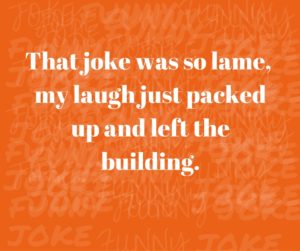Every class has its share of jokers. Some are really funny but unfortunately most aren’t. When they just call out ‘what-they-think-is funny’ quips, I call them hecklers, not jokers.
[su_pullquote]The jokers affect the classroom environment in both positive and negative ways.[/su_pullquote] Positively, it gives a little deviation from the stresses of teaching and learning (T&L). A little breathing time, to relieve your nerves so to speak. Negatively, it disrupts the class and the T&L. This is not acceptable.
These jokers (or hecklers), being our students, need a certain way to be handled. Not too harsh, that they never speak up in class again. Not too soft, that they take over the class and disrupt T&L further.
I turned to how stand-up comedians handle the hecklers during their show. Many ideas and suggestions came from that but some are not suitable for a classroom environment. Here are some of the ideas.
Ignore the interruption and continue
Sometimes joking in class is about attention and reaction. You can just ignore it and continue on. Sometimes, it is even better if you looked at the vicinity of the voice, give a deep sigh and a shake of your head and then continue on. This signals that you do not appreciate that joke, but you are letting them off the hook for now.
Respond in kind
This is when you respond in the same way as the joker. Funny with funny, harsh with harsh. This can backfire and I personally do not encourage it. If a student is making a joke about their friend, you don’t want to add fuel to fire by turning the joke on him, especially if it is not a nice statement. Be careful with this.
Use humor, such as good-natured joking
This is, in my opinion, a fun way to ‘guide’ jokers to contain themselves. I like comedy, so I don’t mind jokes as long as it does not disrupt the T&L and it is funny (but of course!). I think this is a winner.
Recently in class, a group of boys started up joking and making quips I couldn’t quite hear (except for the buzzing sound that accompanies a group of boys who are up to no good). At first I ignored them and continued with the class. But they became a bit bolder. 
There was a lame attempt at a joke from one of the boys, and I took that opportunity to call it out, even making a “lame joke counter” on the whiteboard. Every time they said something that they thought was funny, but was actually not, I gave a tick on the lame joke counter. Things (mostly lame jokes) did quiet down afterwards.
[su_pullquote]Patience is needed when dealing with these students. A cup of patience, a spoonful of wit and a dash of crazy[/su_pullquote].
Why do these kids become jokers and hecklers in the first place? I have some theories.
















